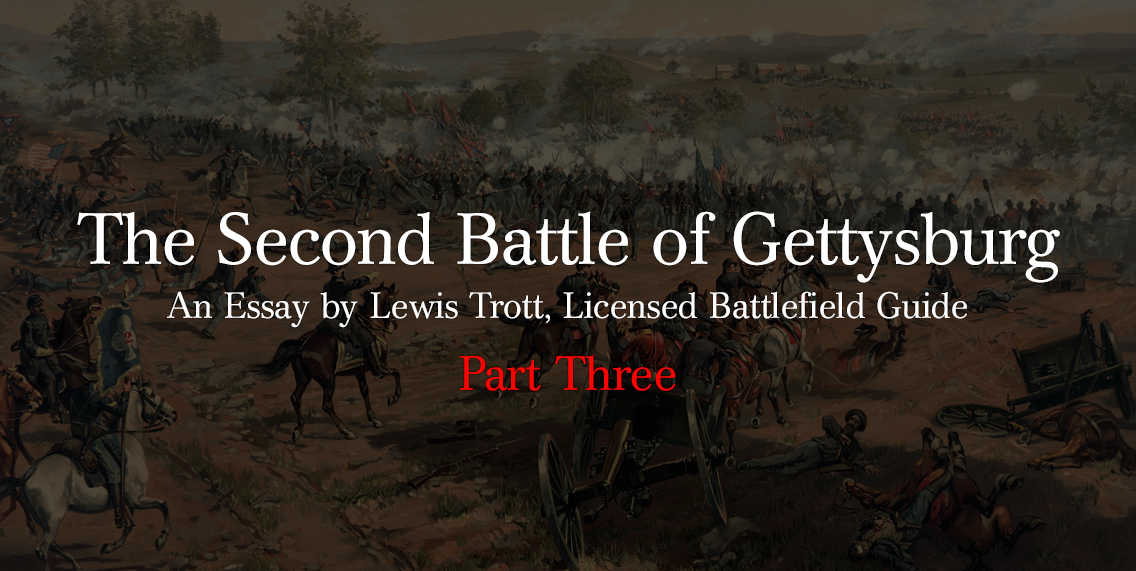
04 Apr The Second Battle of Gettysburg, Part Three
By Lewis Trott, Licensed Battlefield Guide, Gettysburg National Military Park
Major General Abner Doubleday and Brigadier General Albion Howe followed Maj. General Sickles as witnesses before the committee. While Sickles was certainly critical of Meade and in turn promoted his own actions in the defeat of the Confederate army at Gettysburg, both Doubleday and Howe were more pointed in their remarks about Meade. While Doubleday had reason to be unfavorable towards Meade, Brig General Howe’s criticisms seem to be pure politics. And like much of Sickles’ testimony, it was filled with conjecture and speculation (not many visitors to Gettysburg ask to see where exactly Brig. General Howe led his men, although he does have an ave. named in his honor). But Howe had an axe to grind as he had been removed from divisional command on February 29, 1864, just two days before testifying before the committee, and this was his opportunity to get redress for being cast aside.
Unlike Howe, Maj General Doubleday wasn’t even with the AOP throughout the whole of the Gettysburg Campaign, as he was relieved from Corps command on July 2, 1863 after taking that position upon the death of its’ former commander Maj. General John Reynolds. He would leave the AOP on July 7, 1863 after Meade refused to reinstate him to command of the I Corps, never to return to that army, spending the rest of the war in Washington D.C. Doubleday’s criticisms of Meade’s actions begin before the latter ever reached the fields of Gettysburg.
As for the condition of the AOP following the three days of fighting at Gettysburg, Doubleday thought that the army was in good condition to follow up the retreat of the Confederates as “our troops for two days had been lying down a great deal in a defensive position.”[1] It is not apparent as to how the those troops engaged in at times desperate fighting on July 2nd and 3rd would have felt with this analysis. Maj. General Doubleday would further oblige the committee’s desire to impugn Meade’s decision not to attack Lee’s army quickly as the latter had his back to the swollen Potomac at Williamsport by stating that had Meade ordered the attack on July 13, Doubleday had “no doubt, not a particle”[2] as to whether or not the AOP would have destroyed the Confederate Army. Maj. General Doubleday never saw the Confederate defenses of course as he was nowhere near Williamsport on July 13.
Brig. General Albion Howe was another witness given to testifying about events unseen. A division commander in the VI Corps until a reorganization of the AOP left him without a command, Howe was happy to give the Committee all the fodder they sought in trying to have Meade removed from command.
Like Maj. General Doubleday. Howe believed politics was at the root of the lack of aggressiveness in the AOP, particularly during the weeks following the battle of Gettysburg. And in his view this all led to a lack of confidence within the rank and file in their commander Maj. General Meade. Howe did “not think there is that heart, and energy, and earnestness of purpose in the war to make every use of the means at his [Meade’s] command to injure the enemy and carry the war successfully.”[3] Howe would cut to the chase and say “I do not know as I can express myself better than saying that there is copperheadism at the root of the matter.”[4]
____________________________________________________
[1] Report of the Joint Committee on the Conduct of the War at the Second Session Thirty-Eighth Congress. Washington: Government Printing Office,1865, page 312. Accessed through hathitrust.org.
[2] Ibid, 312.
[3] Ibid, 327.
[4] Ibid, 328.
No Comments